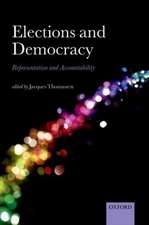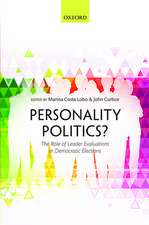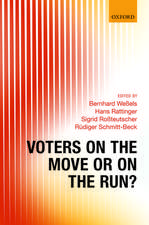Manipulating Political Decentralisation: Africa's Inclusive Autocrats: Conceptualising Comparative Politics
Autor Lovise Aalen, Ragnhild L. Muriaasen Limba Engleză Hardback – 10 oct 2017
Using examples from Africa, Lovise Aalen and Ragnhild L. Muriaas propose five requirements for representative subnational governments and four strategies that national governments might use to manipulate the outcome of political decentralisation. The case studies of Ethiopia, Malawi, South Africa, and Uganda illustrate why autocrats sometimes are more open to competition at the subnational level than democrats.
Manipulating Political Decentralisation provides a new conceptual tool to assess representative subnational governments' quality, aiding us in building theories on the consequences of political decentralisation on democratisation.
Preț: 762.16 lei
Preț vechi: 1101.60 lei
-31% Nou
Puncte Express: 1143
Preț estimativ în valută:
145.86€ • 158.38$ • 122.52£
145.86€ • 158.38$ • 122.52£
Carte tipărită la comandă
Livrare economică 22 aprilie-06 mai
Preluare comenzi: 021 569.72.76
Specificații
ISBN-13: 9781138203037
ISBN-10: 1138203033
Pagini: 194
Ilustrații: 8
Dimensiuni: 152 x 229 x 18 mm
Greutate: 0.34 kg
Ediția:1
Editura: Taylor & Francis
Colecția Routledge
Seria Conceptualising Comparative Politics
Locul publicării:Oxford, United Kingdom
ISBN-10: 1138203033
Pagini: 194
Ilustrații: 8
Dimensiuni: 152 x 229 x 18 mm
Greutate: 0.34 kg
Ediția:1
Editura: Taylor & Francis
Colecția Routledge
Seria Conceptualising Comparative Politics
Locul publicării:Oxford, United Kingdom
Public țintă
Postgraduate and UndergraduateCuprins
Series Editors’ Foreword 1. Introduction 1.1 Elections in authoritarian regimes 1.2 Extending elections to the subnational level 1.3 The argument of the book 1.4 Conceptualisation and methods 1.5 Outline of the book 2. Four Strategies of Manipulation 2.1 Advocating for decentralisation after the Cold War 2.2 How decentralisation failed to deliver 2.3 Why some governments decentralise 2.4 Strategies for Manipulating Political Decentralisation 2.5 Possibilities for contestation and participation 2.6 Conclusions 3. The Requirements of Political Decentralisation 3.1 Unpacking the relationship between regime type and decentralisation 3.2 Elections as hallmarks of political decentralisation 3.3 Requirements for representative subnational governments 3.4 The Four Ways of Manipulating Political Decentralisation 3.5 Case selection 3.6 Conclusions 4. Decentralisation through dominance in Ethiopia 4.1 Ethiopia under EPRDF: Decentralisation and autocratisation side by side 4.2 The requirements of representative subnational governments and their challenges 4.3 Manipulating political decentralisation through dominance 4.4 No contestation but mass-participation 4.5 Conclusions 5. Institutional interruption in Malawi 5.1 Regime and stalled political decentralisation 5.2 The requirements of representative subnational governments 5.3 Identifying Manipulation Strategies 5.4 Opportunities for Contestation and Participation 5.5 Conclusion 6. Overwhelming the opposition in Uganda 6.1 The decentralising autocrat 6.2 The requirements of representative subnational governments 6.3 Identifying Manipulation Strategies 6.4 Opportunities for Contestation and Participation 6.5 Conclusion 7. Regionalised opposition in South Africa 7.1 Democracy and the dominant position of ANC 7.2 The requirements for representative subnational governments 7.3 Manipulating Political Decentralisation 7.4 Consequences for contestation and participation 7.5 Conclusion 8. Conclusions 8.1 The five requirements of representative SNGs 8.2 Manipulation strategies and the space for contestation and participation 8.3 Extension to other cases 8.4 The challenges of measuring and comparing local government 8.5 Inclusive autocrats 8.6 The way forward
Notă biografică
Lovise Aalen is a Political Scientist and Research Director at Chr. Michelsen Institute. Her research interests include institutional solutions in divided societies, including power sharing, federalism, and decentralisation. She has explored the impact of introducing ethnic federalism in Ethiopia, and has demonstrated how ethnic-based federalism was an important tool for the ruling party to gain legitimacy, control, and support across ethnic groups, thereby sustaining the national government rather than deepening democracy.
Ragnhild L. Muriaas is Professor in Political Science at the University of Bergen and an Associated Senior Researcher at Chr. Michelsen Institute. Her key research interest is explaining variation in the inclusionary aspects of African regimes. She has led international research projects and published extensively on topics related to political decentralisation, traditional authorities, and women’s representation in Malawi, Uganda, South Africa, and Zambia.
Ragnhild L. Muriaas is Professor in Political Science at the University of Bergen and an Associated Senior Researcher at Chr. Michelsen Institute. Her key research interest is explaining variation in the inclusionary aspects of African regimes. She has led international research projects and published extensively on topics related to political decentralisation, traditional authorities, and women’s representation in Malawi, Uganda, South Africa, and Zambia.
Recenzii
'Lovise Aalen and Ragnhild Muriaas provide a timely and thorough analysis of how incumbent elites can employ strategies that undermine decentralisation. ... Well-written and carefully researched, this book provides important insights into the politics of decentralisation and a much-needed note of caution to those who expect decentralisation to limit political capture.' –Ellen Lust, Yale University
'Although there is broad recognition that subnational elections need not generate the expected benefits of local democracy, Aalen and Muriaas provide an unusually thorough, systematic, and grounded analysis of the factors and dynamics that shape the relationship between decentralisation and democracy. This work is invaluable to scholars and practitioners interested in understanding the forms, roles, and potential effects of political decentralisation in Africa and beyond.'
–Paul Smoke, New York University
'Although there is broad recognition that subnational elections need not generate the expected benefits of local democracy, Aalen and Muriaas provide an unusually thorough, systematic, and grounded analysis of the factors and dynamics that shape the relationship between decentralisation and democracy. This work is invaluable to scholars and practitioners interested in understanding the forms, roles, and potential effects of political decentralisation in Africa and beyond.'
–Paul Smoke, New York University
Descriere
Manipulating Political Decentralisation provides a new conceptual tool to assess representative subnational governments' quality, aiding us in building theories on the consequences of political decentralisation on democratisation.





























